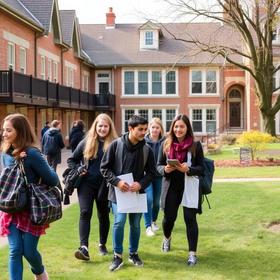Do Boarding School Graduates Have Better College Outcomes?
Parents, educators, and students often wonder: does attending a boarding school improve a student’s prospects in college? The short answer is: often—but with important caveats. In this article, we dig into the evidence, clarifying when and how a boarding school experience may contribute to stronger college outcomes, and when it may not.
What Do We Mean by “Better College Outcomes”?
By “better college outcomes,” we refer primarily to:
College enrollment rate (immediately after high school)
Persistence (continuing to year two and beyond)
Graduation rates (within four, five, or six years)
Institutional selectivity and degree quality
Longer-term outcomes (graduate degrees, earnings, leadership roles)
In assessing boarding school impact, we must account for selection effects—students who enroll in boarding schools often already differ in family background, resources, academic readiness, or ambition from peers in day schools or public schools.
What the Research Shows
Historical and Programmatic Studies
One of the more cited studies, commissioned by the Association of Boarding Schools (TABS), surveyed over 2,700 students and alumni (boarding, private-day, public) and found that boarding school graduates were more likely to:
Report strong academic and nonacademic preparation for college
Enroll and excel in higher education
Advance more rapidly in their careers
Assume leadership roles and contribute philanthropically woodberry.org
This suggests an advantage not only in raw outcomes but also in confidence, ambition, and social capital.
However, this kind of study is limited by self-reporting and potential bias from affiliated respondents. More rigorous, independent studies are rarer and more illuminating.
Programs, Comparisons, and Selection Controls
While not boarding-specific, research in private school choice contexts offers useful analogies. For instance, a 2019 Urban Institute report on private school voucher programs (e.g. in Florida, Milwaukee) showed that these programs sometimes led to modest positive gains in college enrollment and degree completion compared with matched public school controls. Urban Institute
Meanwhile, broader analyses underscore that socioeconomic context often dominates differences in college outcomes. A 2025 High School Benchmarks study by the National Student Clearinghouse revealed that the income composition of a high school is among the strongest predictors of postsecondary degree attainment—stronger than school type or geography. studentclearinghouse.org
Thus, in many situations, boarding school advantages may stem less from boarding per se and more from admitting students from wealthier, more advantaged backgrounds.
Parallel Evidence: Advanced Curricula & Persistence
One illustrative comparison: students who complete the International Baccalaureate (IB) Diploma Programme tend to enroll in colleges at higher rates, persist more strongly, and graduate at higher rates than average U.S. students. According to a 2024 summary of IB data, DP graduates enrolled immediately at a rate of 74% (vs. 64% national average), chose four-year institutions more often, had year-to-year persistence of 88%, and posted six-year graduation rates near 86% (vs. 68% nationally). International Baccalaureate®
While IB participation is not equivalent to boarding, it reflects how intensive curricula, rigorous expectations, and strong support systems correlate with better college outcomes. Boarding schools frequently provide those supports (e.g. small cohorts, extended study times, academic supervision).
Why Boarding Might Help: Mechanisms at Work
To understand when boarding yields improved college outcomes, consider some of the mechanisms through which it can matter:
Mechanism | How It Can Help | Caveats / Risks |
Structured time & academic rigor | Boarding schools often enforce study halls, limit distractions, and insist on more instructional time. | If students don’t engage, extra time alone won’t guarantee growth. |
Peer environment & culture | Surrounded by motivated, high-achieving peers, students may push each other academically. | Peer effects can cut both ways—if expectations drop, negative peer norms may dominate. |
Access to resources & counseling | Boarding campuses often provide dedicated college counseling, enrichment electives, and robust extracurriculars. | Quality matters. If a boarding school lacks strong college advising, gains may be muted. |
Early independence & self-regulation | Living away helps students develop time management, resilience, and self-directed learning—skills that serve in college. | The adjustment may challenge some students; supports must be in place. |
Social capital & networks | Boarding alumni communities can open doors to internships, mentorship, and college networking. | These benefits disproportionately favor those already connected or able to leverage such networks. |
Crucially, these mechanisms are not guaranteed by boarding status alone—they depend on school design, culture, and execution.
When Boarding May Not Yield Better Outcomes
Boarding school is neither a magic bullet nor a universal accelerator. Several factors mitigate its impact:
Poor alignment with student needs: A student without strong self-discipline or emotional maturity may struggle in a residential setting without adequate support (e.g. mentoring, counseling, adult supervision).
Selection bias: Many boarding students come from privileged backgrounds, have prior high achievement, or benefit from parental resources—advantages that already predispose them toward college success.
Underperformance in advising: A boarding school with weak college counseling or low expectations may not translate its rigor into better college outcomes.
Costs & stress: The financial burden, distance from family, or social adjustment issues may offset academic benefits for some students.
In other words, the “boarding effect” likely magnifies existing advantages rather than converting low-potential students into high performers.
Real-World Examples & Trends (2025 Update)
Many leading U.S. boarding schools report near-universal college matriculation and high acceptance rates at selective universities. For example, Storm King School mentions that recent graduates have matriculated at Ivy League and similarly selective institutions. Wikipedia
International dialogues on boarding (e.g. in parts of Africa or Asia) suggest growing interest, but rigorous tracking of college and degree outcomes remains limited outside North America.
Experts in 2025 emphasize that boarding schools should invest heavily in support structures (mental health, transition coaches, academic scaffolding) to ensure that the boarding environment boosts, rather than hinders, college readiness.
Interpreting the Evidence: What Comes Through Clearly
From the research and practice, certain conclusions are defensible:
Boarding school graduates often show favorable college outcomes—higher enrollment, stronger persistence, and better graduation rates—especially when compared to matched or comparable peers.
But much of the observed advantage is attributable to selection: demographic, academic, and socioeconomic characteristics of boarding students account for a large portion of outcome differences.
The institutional quality of the boarding school matters immensely, particularly in how well it cultivates study habits, provides counseling, and supports student well-being.
Boarding is most effective as a lever for students who already exhibit strong academic potential, self-motivation, or who access high-quality boarding programs—not as a universal remedy.
Recommendations for Parents, Students & Schools
For Parents & Prospective Students
Evaluate not just boarding status but the support systems in place (academic supervision, counseling, mentorship).
Ask for data: What are the school’s graduation, matriculation, and persistence statistics (ideally with matched cohorts)?
Consider student readiness: Is your child mature enough to live away, manage time, and handle transitions?
For Schools & Administrators
Implement robust academic scaffolding in the first year (e.g. supervised study hours, coaching).
Prioritize college counseling and transition support, especially for first-generation students.
Monitor outcomes disaggregated by subgroups (e.g. lower-income, international, marginalized) to ensure boarding benefits are equitably distributed.
Cultivate peer culture, structured challenge, and academic norms that align with the expectations of college rigor.
Conclusion
Do boarding school graduates have better college outcomes? The evidence—historical, comparative, and programmatic—supports a qualified “yes.” But the advantage is not universal or automatic. It depends heavily on who attends, how the school is structured, and whether supports are built in.
In 2025 and beyond, the challenge for boarding schools is clear: deepen their understanding of student outcomes, strengthen scaffolding and supports, and ensure that the boarding environment is more than just a residential setting—it must become a launchpad for long-term academic and personal success.
When institutions get that right, the boarding experience can indeed translate into measurable advantages in college and beyond—for the right students, under the right conditions.












